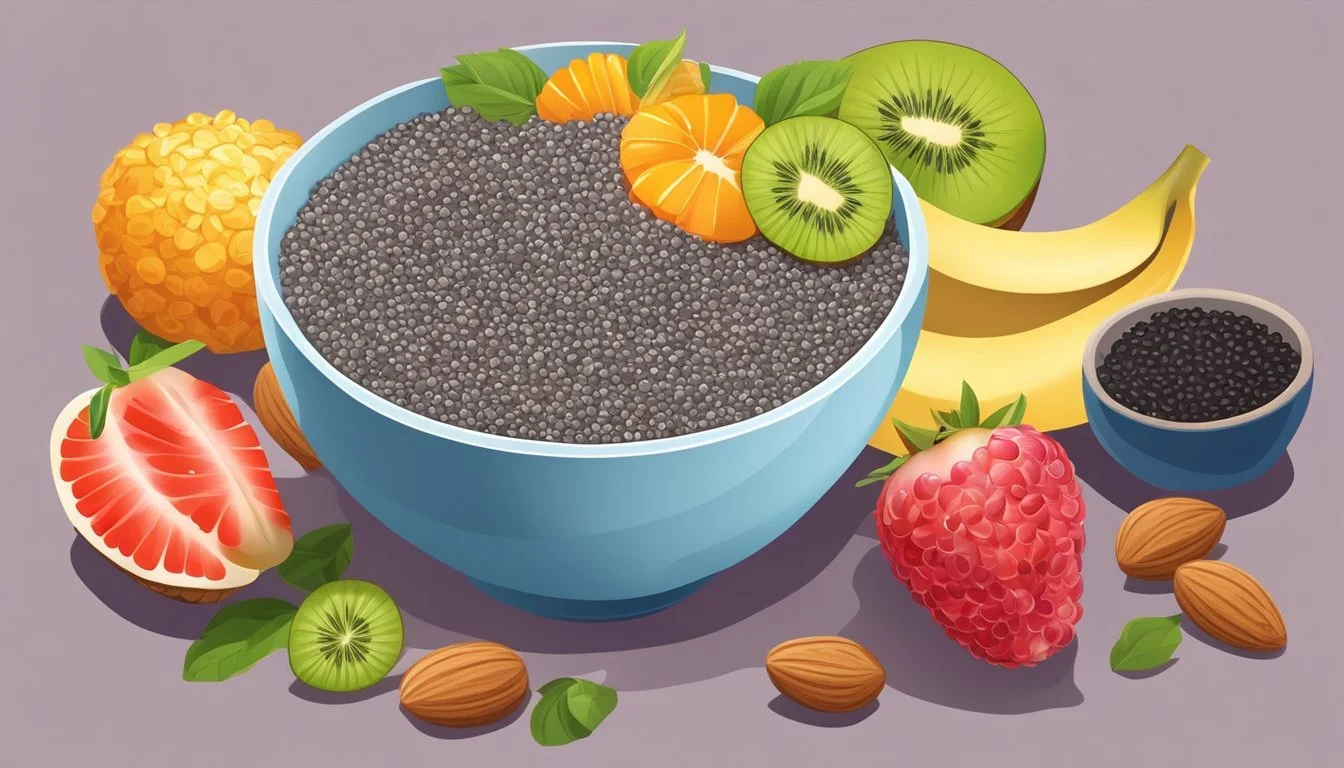Foods Rich in Nucleic Acid
Essential for Cellular Health
Nucleic acids play an integral role in the body as they are the essential components of DNA and RNA, which are crucial for genetic information and protein synthesis. Understanding which foods are high in nucleic acids can help individuals make informed dietary choices to support cellular functions and overall health.
Identifying and incorporating foods rich in nucleic acids can significantly contribute to a balanced diet. Various everyday foods naturally contain these vital compounds, supporting bodily processes at the cellular level. This article will explore dietary sources that can help maintain optimal cellular health through adequate nucleic acid intake.
1) Salmon
Salmon is a notable source of nucleic acids. Both farmed and wild salmon are rich in these essential compounds.
A typical 3.5-ounce (100-gram) portion of salmon provides significant nutritional benefits, including a variety of essential amino acids. This makes it a beneficial addition to one's diet.
In addition to nucleic acids, salmon is also packed with long-chain omega-3 fatty acids. These healthy fats contribute to numerous health benefits.
It's important to note that salmon, whether wild or farmed, offers a considerable amount of nutrients beyond nucleic acids. Regular consumption of salmon can be a part of a balanced diet.
2) Sardines
Sardines are notably high in nucleic acids, which are vital for cellular functions. These small, oily fish contain rich concentrations of DNA and RNA, making them a beneficial food source for nucleic acid intake.
In addition to nucleic acids, sardines are packed with essential nutrients. They are a rich source of omega-3 fatty acids, which support heart health and reduce inflammation.
Sardines are also high in protein, providing a complete amino acid profile necessary for muscle repair and growth. They deliver significant levels of vitamin B12 and selenium, contributing to energy metabolism and antioxidant functions.
Convenience is another advantage of sardines. They are available canned or fresh, making them accessible for various culinary uses while retaining their nutritional benefits.
Including sardines regularly in the diet can assist in meeting daily nutritional needs due to their dense nutrient profile.
3) Chia Seeds
Chia seeds are packed with nutrients that contribute to numerous health benefits. They have been a staple food for the Aztecs and Mayans due to their impressive nutritional profile. Each ounce (28 grams) of chia seeds contains 138 calories, making them a calorie-dense food rich in various nutrients.
By weight, chia seeds are composed of approximately 6% water, 46% carbohydrates, 34% fat, and 19% protein. The carbohydrate content is mostly fiber, which aids in digestion and promotes a feeling of fullness. This makes chia seeds a valuable addition to a healthy diet.
Chia seeds are a potent source of omega-3 fatty acids, particularly alpha-linoleic acid (ALA). These fatty acids are essential for maintaining heart health by promoting a balanced ratio of omega-6 to omega-3 fatty acids.
Moreover, chia seeds contain various vitamins and minerals, such as calcium, magnesium, and phosphorus. These nutrients are crucial for bone health, energy production, and metabolic processes.
Incorporating chia seeds into meals can be simple. They can be added to yogurt, smoothies, or baked goods. Their ability to absorb water also makes them ideal for creating nutrient-dense puddings.
For those managing diabetes, chia seeds offer benefits due to their high fiber and omega-3 content. Consuming chia seeds can help reduce inflammation and regulate blood sugar levels, enhancing overall health management.
4) Lentils
Lentils, a type of legume, are not only rich in protein and fiber but also contain trace amounts of nucleic acids. These edible seeds are packed with essential nutrients, including carbohydrates, protein, iron, and lysine.
A half-cup serving of cooked lentils provides around 116-140 calories, with 12-25 grams of protein and 20-23 grams of carbohydrates. This makes lentils a beneficial addition to any diet.
In terms of minerals, lentils supply potassium, zinc, copper, manganese, and phosphorus. Their high fiber content helps support digestive health and regular bowel movements. This combination of nutrients supports overall wellness and keeps you energized.
Lentils can be easily incorporated into various dishes, such as soups, salads, and stews, making them versatile in cooking. Their nutritional profile makes them an excellent option for both plant-based and general diets, contributing to a balanced and healthy intake.
5) Quinoa
Quinoa is a nutrient-rich seed often treated as a whole grain. Originating from South America, it has been a staple food for centuries. It is known for its high protein content and essential amino acids.
Besides protein, quinoa is particularly high in fiber. A typical serving of this cooked grain—for instance, one cup—contains about 5 grams of fiber. This aids in digestion and helps maintain a healthy weight.
Quinoa is also rich in minerals such as magnesium, phosphorus, manganese, and iron. These minerals contribute to various bodily functions, including bone health and energy metabolism.
In terms of nucleic acids, quinoa provides a moderate amount. Nucleic acids like DNA and RNA are found in the cells of all living organisms, including plants. When consumed, they support cellular functions and the synthesis of new cells.
Moreover, quinoa is gluten-free, making it suitable for those with gluten intolerance or celiac disease. Its versatility allows it to be used in various dishes, from salads to soups and main courses.
Lastly, quinoa has a low glycemic index. This means it won't cause a rapid spike in blood sugar levels, making it a suitable option for individuals monitoring their blood sugar.
6) Mussels
Mussels are a popular type of shellfish known for their rich nutritional profile, including a high content of nucleic acids. These shellfish are often highlighted for their significant levels of protein, omega-3 fatty acids, and various vitamins and minerals.
Mussels provide all essential amino acids, making them an excellent protein source. Compared to fish with fins, their protein content is superior. This makes mussels a valuable addition to a balanced diet, especially for those seeking nutrient-dense foods.
In terms of nucleic acids, mussels rank among the top sources. This is vital for cellular functions, including the storage and transmission of genetic information. The high nucleic acid content in mussels supports processes like cell growth and repair.
Moreover, mussels are affordable and sustainable. They are a more environmentally friendly option compared to other seafood, contributing to their popularity. Including mussels in the diet can also be an easy way to boost nutrient intake without adding excessive calories.
7) Almonds
Almonds are a nutritious snack, offering several health benefits. They are well-known for their high protein content, providing 21.2 grams of protein per 100 grams. This makes them one of the richest plant-based protein sources.
In addition to protein, almonds contain significant amounts of fat. A single ounce includes about 22% of the recommended daily fat intake. Most of this fat is monounsaturated, which is beneficial for heart health.
While almonds do contain some nucleic acids, they are not as rich in these compounds compared to meat or fish. Nevertheless, they remain a valuable part of a balanced diet due to their other beneficial nutrients.
Almonds also offer various vitamins and minerals, contributing to overall nutrition. They are particularly high in vitamin E, which acts as an antioxidant. Additionally, almonds provide magnesium, which is important for muscle and nerve function.
8) Spinach
Spinach is a leafy green vegetable known for its rich nutritional profile. Beyond its vitamins and minerals, spinach also contains nucleic acids.
These compounds contribute to spinach's benefits for cellular functions.
In a 100-gram serving, spinach offers around 23 calories, making it a low-calorie option. It provides essential nutrients like protein, fiber, and various vitamins.
The presence of nucleic acids in spinach supports DNA and RNA synthesis, vital for cell repair and growth.
Including spinach in the diet can contribute to overall health by providing these crucial elements.
9) Chicken Breast
Chicken breast is known for its lean protein content and is widely recommended for a balanced diet. Beyond its protein benefits, it is also a notable source of nucleic acids.
A 3-ounce (85-gram) portion of skinless cooked chicken breast provides about 26 grams of protein and is low in fat.
Animal muscles, including chicken, naturally contain high levels of nucleic acids. These compounds are essential for various bodily functions, including cellular repair and genetic information storage. Chicken breast, being a part of the muscle tissue, contributes significantly to this nutrient profile.
In addition to nucleic acids, chicken breast is rich in essential amino acids and B vitamins. It is particularly high in vitamin B12, which is crucial for nerve function and red blood cell formation.
For those seeking to increase their intake of nucleic acids and maintain a low-fat diet, chicken breast is an excellent option. It offers a combination of high-quality protein, vital nutrients, and is versatile in various culinary preparations.
10) Broccoli
Broccoli is a valuable vegetable that contains nucleic acids, particularly in its cellular structure. These nucleic acids play a crucial role in its growth and development.
Rich in various nutrients, broccoli provides essential compounds like DNA and RNA, which are present in all living cells. Including broccoli in a diet contributes to the intake of nucleic acids.
Besides its nucleic acid content, broccoli is also known for its high levels of vitamins, minerals, and fiber. Its health benefits make it a popular choice among various age groups and dietary preferences.
Broccoli's combination of essential nutrients and nucleic acids supports overall cellular health. It's an excellent addition to a balanced diet focused on nutrient-rich foods.
Understanding Nucleic Acids
Nucleic acids are essential biomolecules critical for various biological processes. They play significant roles in genetics, cell function, and human health.
Definition and Types
Nucleic acids are large molecules found in all living cells, composed of nucleotides. Nucleotides consist of a sugar, a phosphate group, and a nitrogenous base. There are two primary types: DNA (Deoxyribonucleic Acid) and RNA (Ribonucleic Acid).
DNA stores genetic information vital for the development, function, and reproduction of organisms. RNA is involved in protein synthesis and the transmission of genetic information.
The primary bases in DNA are adenine, thymine, cytosine, and guanine, while RNA contains adenine, uracil, cytosine, and guanine.
Role in the Human Body
Nucleic acids have fundamental roles in cellular and molecular functions. DNA serves as the blueprint for all genetic information, guiding the synthesis of proteins and other molecules necessary for life.
RNA acts as the messenger, transcribing genetic information from DNA and translating it into proteins through processes like transcription and translation. This synthesis ensures that cells function correctly and that the body performs its essential tasks.
Moreover, nucleic acids are involved in cell division, ensuring that genetic information is accurately replicated and passed on to new cells. They also contribute to cellular growth, repair, and energy metabolism, making them indispensable for maintaining overall health and well-being.
Nutritional Benefits of Nucleic Acids
Nucleic acids, vital for cellular function and DNA replication, offer several nutritional benefits. These compounds support a wide range of bodily functions and can be derived from various foods.
Immune System Support: Consuming foods rich in nucleic acids helps bolster the immune system. This support is crucial for maintaining the body's defense against pathogens.
Muscle Recovery: Nucleic acids contribute to muscle repair and growth. This makes them particularly important for athletes and individuals engaging in regular physical activity.
Metabolism Regulation: They play a role in enhancing metabolic processes. This regulation is necessary for maintaining energy levels and overall cellular health.
Top Food Sources:
Seafood: Rich in nucleic acids, especially fish and shellfish.
Meat: Beef and lean meats contain significant amounts.
Vegetables: Certain vegetables provide smaller, but beneficial amounts.
Mushrooms: Varieties like maitake and shiitake are particularly high.
Nuts and Seeds: Offer additional nutritional value along with nucleic acids.
Including a variety of these foods in the diet can help ensure adequate intake.
Digestive Process and Nucleic Acids
Nucleic acids in food are broken down into their component molecules during digestion. These components play a significant role in absorption and gut health.
Absorption Mechanisms
When nucleic acids enter the digestive system, enzymes break them down into nucleotides. These nucleotides are further broken down into pentose sugars, nitrogenous bases, and phosphate ions.
Enyzmes such as nucleases, produced by the pancreas, are vital in this process.
Once broken down, these components are absorbed through the intestinal lining into the bloodstream. Absorption happens primarily in the small intestine, ensuring essential molecules are distributed to cells throughout the body.
Impact on Gut Health
The digestion of nucleic acids affects bacterial composition in the gut. Beneficial bacteria utilize nucleotides for growth and function, aiding in maintaining a balanced microbiome.
High nucleic acid foods, like meat and seafood, should be balanced with plant-based sources. Excessive intake from animal sources may lead to conditions like gout, due to the production of uric acid.
Providing dietary variety supports gut health and avoids overloading the metabolic pathways involved in nucleic acid breakdown.












